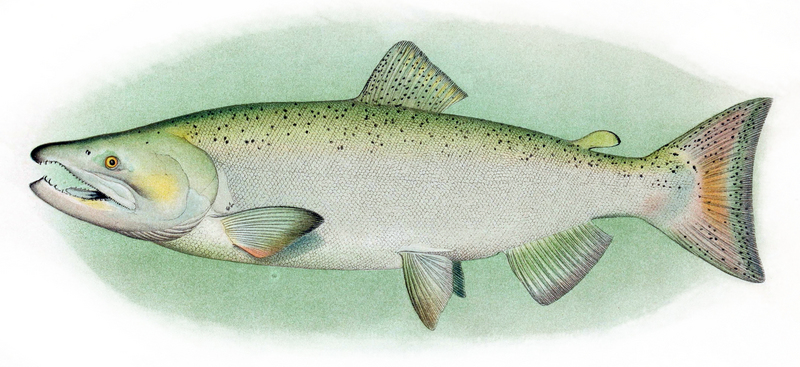|
| Query: fishes | Result: 1717th of 13224 | |
Chinook salmon (Oncorhynchus tshawytscha)
| Subject: | Chinook salmon (Oncorhynchus tshawytscha)
| | Poster: | Wiki Photos (---@---.---)
| |

| Resolution: 3000x1378
File Size: 2596655 Bytes
Date: 2013:10:25 22:14:22
Upload Date: 2017:02:02 15:39:07
|
Description
English: Chinook Salmon, Adult Male
Date 1907
Source Scanned from plates in Evermann, Barton Warren; Goldsborough, Edmund Lee (1907) The Fishes of Alaska, Washington, D.C.: Department of Commerce and Labor Bureau of Fisheries
Author A. Hoen and Co.
Source: https://commons.wikimedia.org/wiki/File:Chinook_Salmon_Adult_Male.jpg
The Chinook salmon (Oncorhynchus tshawytscha) is the largest species in the Pacific salmon genus Oncorhynchus. The common name refers to the Chinookan peoples. Other vernacular names for the species include king salmon, Quinnat salmon, spring salmon, and Tyee salmon. The scientific species name, tshawytscha, is based on the Russian common name chavycha (чавыча). Chinook salmons are anadromous fish native to the North Pacific Ocean and the river systems of western North America, ranging from California to Alaska, as well as Asian rivers ranging from northern Japan to the Palyavaam River in the Arctic north-east Siberia. Order: Salmoniformes, Family: Salmonidae, Species: Oncorhynchus tshawytscha (Walbaum, 1792)
|
Comments |
|---|
| | Guest |
|
Chinook Salmon, Oncorhynchus tshawytscha
The chinook is the largest of the Pacific Coast salmons, reaching a length of 160 cm and a weight of 61.2 kg! This species is distinguished from its relatives by the number of scales along its lateral line, the number of rays on its fins, as well as the colour and markings on its body. The dorsal area and flanks of the chinook salmon are iridescent green or blue-green to black with a golden sheen, while the lower flank and belly are silvery to silvery-white. The adipose fin has a dark margin with a white centre. The body shape is typical of salmon with a distinct adipose fin, triangularly shaped dorsal fin, deeply forked caudal fin, rectangular anal fin, and streamlined pectoral fins. Young chinook have 6 to 12 parr marks along their flanks. |
^o^
Animal Pictures Archive for smart phones
^o^
|
|
|

